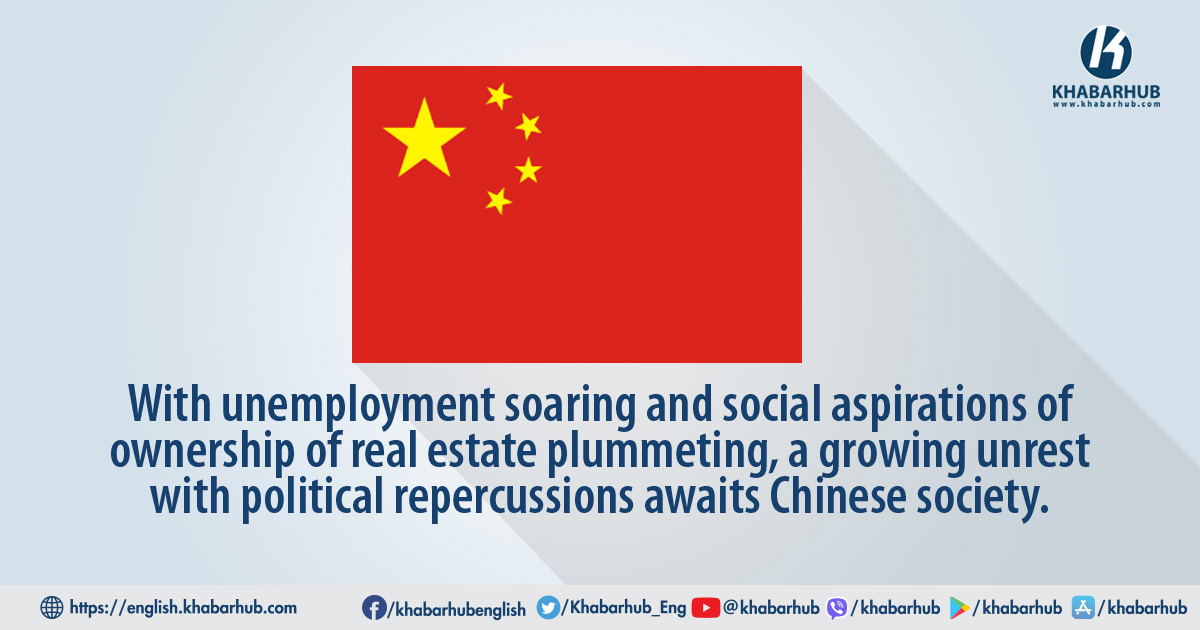China’s real estate crisis seems to find no end to the ever-growing economic distress in the country at the moment.
Although the country has been burdened with the almost collapse of the property sector for the past two years, the issue as of today is a ticking time bomb that threatens to wreak havoc on the global economy.
China’s economic turmoil has had consequential rippling effects across international markets, leaving a trail of the Chinese government’s mismanagement and ad-hoc measures that are further deteriorating the situation in its wake.
At the heart of China’s real estate crisis lies a series of ill-policy decisions led by reckless speculations, inflated property prices, and unsustainable debt levels.
For years, the Chinese government fueled property frenzy, pouring trillions of yuan into an already burdened and overheated market.
In its relentless pursuit of economic growth, the Communist Party of China (CPC) prioritized quantity over quality, recklessly constructing ghost cities and developmental projects destined to become empty white elephant projects in excess.
The Chinese developer firm, Country Garden, stated that the petition was filed due to the non-payment of a $205 million loan, further signifying the overburdening debt issue within the sector.
As the real estate bubble swells to uncontainable proportions, so is the debt burden weighing on Chinese middle-class households and more so upon the developers of these projects.
With mortgages stretching far beyond their means and developers drowning in a sea of unpaid loans, the faultiness within China’s housing market is becoming apparent.
Yet, rather than addressing the root causes of the crisis, the CPC has been doubling down upon its failed policies, aiming to resort to desperate measures to show that they have the situation under control, a facade of prosperity as many observers of the real estate crisis would like to call it.
China’s real estate crisis and its detrimental consequences
Unfortunately, for the Party, however, and perhaps even more so for the global market, the facade is crumbling from within, and the consequences have greater implications than just within China’s borders.
As property prices skyrocket and defaulters soar, the ripple effects of China’s real estate crisis are being felt across the global economy.
International investors are worried that their wealth may evaporate overnight, triggering a domino effect of financial turmoil and investment pullbacks.
A prime example of the consequential effects that the Party’s ill-informed decision-making has had is in the case of the downfall of China Evergrande.
The group is one of China’s largest property developers and has gone on to become both a symbolic and practical example of the broader issues plaguing the property sector in China.
The company’s aggressive expansion, through the rapid acquisition of land and significant borrowings, eventually led to its financial downfall, causing a ripple effect into other Chinese companies’ financial stabilities as well.
This case also exemplified the broader vulnerabilities within China’s real estate market, including high levels of debt, a slowdown in property sales, and regulatory changes aimed at curbing speculative investments.
Furthermore, more recently, Ever Credit Limited filed for liquidation against Country Garden, one of China’s largest real estate firms.
Until decisive actions are taken to address the root causes of the crisis and mitigate its impact, China and as a consequence, the global economy stand on the brink of an economic catastrophe due to the substandard crisis management of the Communist Party of China.
This has only further strengthened existing worries regarding the stability of China’s property market and has also raised several questions regarding the effectiveness of the CPC’s, rather hollow, interventions.
The Chinese developer firm, Country Garden, stated that the petition was filed due to the non-payment of a $205 million loan, further signifying the overburdening debt issue within the sector.
This has not only undermined the Party’s effort to restore confidence in the property sector but has once again also raised serious questions against the CPC’s plans in tackling the ongoing crisis.
The overall real estate crisis has had wide-ranging implications, not just for the real estate market but also more so for the domestic economy as a whole.
Between 2020 and 2023, the sector has faced $125 billion in bond defaults, leading to layoffs and financial instability.
However, the most significant impact of them all has been the damaging effect on the country’s post-pandemic economic recovery.
With the subsidence of the country’s construction sector, it is only a matter of time before the overall domestic demand for commodities caves in, causing further distress within the domestic economy and more so passing on the implications to exporting countries dependent on the Chinese economy.
The social ramifications of the crisis too are of equal, if not far more severe consequences.
With unemployment soaring and social aspirations of ownership of real estate plummeting, a growing unrest with political repercussions awaits the Chinese society.
Thus, not only is a looming economic crisis on the horizon, but a far more consequential disaster may destabilize the global economy, which is already attempting to make its post-pandemic recovery.
Until decisive actions are taken to address the root causes of the crisis and mitigate its impact, China and as a consequence, the global economy stand on the brink of an economic catastrophe due to the substandard crisis management of the Communist Party of China.









Comment